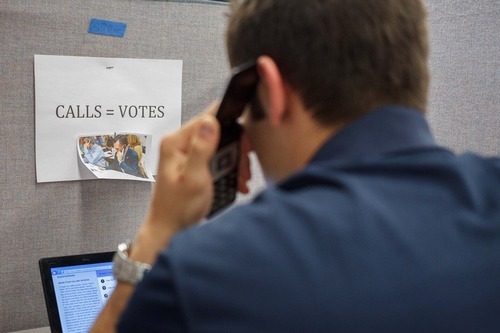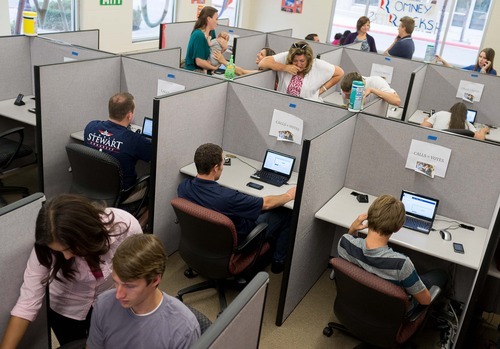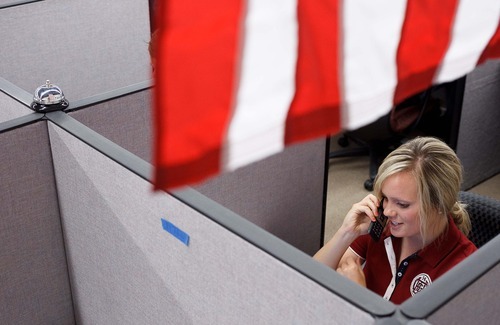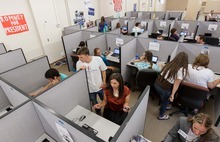This is an archived article that was published on sltrib.com in 2012, and information in the article may be outdated. It is provided only for personal research purposes and may not be reprinted.
Orem • In a sparsely decorated office next to Utah Valley University student housing, a call center has sprung up where devoted Mitt Romney supporters pound the phones, calling battleground states to drum up support for their candidate.
The operation gives the Romney faithful in Utah an electoral outlet for their enthusiasm, letting them play a part in who wins the White House — even though they live in a red state that is a million metaphorical miles from the contested battlegrounds.
"For us, the biggest thing is that technology today and the organization of the Romney campaign allow us to be right in the thick of battleground states," said Thomas Wright, chairman of the Utah Republican Party. "And Mitt is relying on Utah Republicans to deliver the Intermountain West and [help him become] the next president of the United States."
The Utah GOP is paying for the call center for the Romney campaign and plans to open three others — in Logan, St. George and Sandy — by month's end.
It's all part of the Utah Republican Party Victory Campaign, aimed at letting Beehive State party members project their influence into the key swing states such as Nevada and Colorado.
Earlier this month, Utah Republicans caravaned to Mesquite, Nev., to make phone calls, knock on doors and canvass neighborhoods for the Romney campaign.
The practice is hardly unique to Republicans. Utah Democrats also plan to send supporters of President Barack Obama into nearby states, as well. (The Salt Lake Tribune will highlight both parties' outreach efforts throughout the campaign.)
"Nobody from any presidential campaign is going to campaign here too actively," said Matthew Burbank, a political science professor at the University of Utah. "But even though Romney isn't going to spend a lot of time here campaigning, he should take advantage of the fact he's got a lot of people here who support him."
Burbank said campaigns have tried for years to leverage backers in noncompetitive states to help in battleground states, but until recently call centers were too expensive for most campaigns.
It's harder to tell, however, how much difference the calls make, Burbank said. Campaigns like to have the most information they can, so in that regard they help, and a personal call is more effective than automated robo-calls at getting people to the polls.
"Here in Utah, we're so red that, in the grand scheme of things, it's kind of useless … for us in the Electoral College," said Kraig Thorne, a volunteer from Pleasant Grove. But making calls into swing states offers him a chance to show his support in a way that could make a difference.
"Even though I'm not rich enough to give Romney a lot of money, by volunteering my time, it's less money he has to spend to do the job," Thorne said. "It's sweat equity."
Identifying swing voters in swing states means that not everyone at the other end of the phone line will be a Romney supporter, said Kylie Cobb, a Brigham Young University student, who, like most of the volunteers Thursday, was calling into Colorado.
"Sometimes they're very gung-ho for Romney, sometimes they're not," said Octavia Escamilla, an intern on the Romney campaign. "You have to respect other people's opinion and remember that I'm just trying to get the vote out for my party. … You let them say what they have to say and then say, 'thanks.' "
The volunteers' script focused on the Affordable Care Act — or "Obamacare" as it was referred to in calls. The volunteers would ask voters if they were for or against it and then inquire if they were Romney backers. If they were, they would try to commit them to volunteer or otherwise help the campaign and log it into a database.
Amelia Powers, a mother of two, said she volunteered because she believes a Romney administration would revive the economy.
"The livelihood of my family depends really on whether we have a government that allows private industry to succeed," said Powers, who has been the family breadwinner since her husband's construction job disappeared several years ago. "I feel very strongly about this."
Powers also said she spent four years in Canada. Both she and her unborn son nearly died because of poor care received under Canada's medical system.
"I bear the scars of socialized medicine," she said, expressing fears Obama would move in that direction.
Ryan Greenburg, a BYU student originally from Georgia who made about three dozen calls to Florida voters Thursday, said he tried to be enthusiastic and upbeat while phoning people.
"There are a lot of us who are really excited about it," he said, " … and I feel like I'm making a difference."









